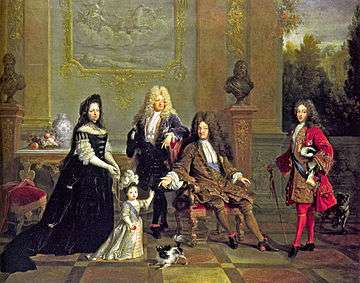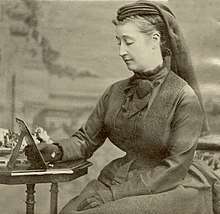Dowager
A dowager is a widow who holds a title or property—a "dower"—derived from her deceased husband.[1] As an adjective, dowager usually appears in association with monarchical and aristocratic titles.
In popular usage, the noun dowager may refer to any elderly widow, especially one of both wealth and dignity.
Use


In the United Kingdom
In the United Kingdom, the widow of a peer may continue to use the style she had during her husband's lifetime, e.g. "Countess of Loamshire", provided that his successor, if any, has no wife to bear the plain title. Otherwise she more properly prefixes either her forename or the word Dowager, e.g. "Jane, Countess of Loamshire" or "Dowager Countess of Loamshire" (In any case she would continue to be called "Lady Loamshire").
The term queen dowager is used in the United Kingdom and several other countries for the widow of a king.
In other countries
This form of address used for noble ladies whose husbands have died. It was used for the late Queen Dowager, Fabiola of Belgium and for the Dowager countess d'Udekem d'Acoz.
Queen Victoria Eugenia of Spain was known as dowager queen after the death of her husband.[2]
References
- ↑ "Queen as a Title - History of Titles for Female Rulers". about.com. Retrieved 19 March 2017.
- ↑ lesoir.be. "Baudouin et Fabiola, un couple fusionnel". lesoir.be. Retrieved 19 March 2017.
External links
| Look up dowager in Wiktionary, the free dictionary. |
